Chief of the Defence Staff (United Kingdom)
| Chief of the Defence Staff | |
|---|---|
|
Ministry of Defence coat of arms | |
|
Flag of the Chief of the Defence Staff | |
| Ministry of Defence | |
| Member of |
Defence Council Chiefs of Staff Committee |
| Reports to | Secretary of State for Defence |
| Nominator | Recommendation of Secretary of State for Defence to the Prime Minister |
| Appointer | Approved by the Monarch[1] |
| Formation | 1 January 1959 |
| First holder | Marshal of the RAF Sir William Dickson |
| Deputy | Vice-Chief of the Defence Staff |
| Website | |
The Chief of the Defence Staff (CDS) is the professional head of the British Armed Forces and the most senior uniformed military adviser to the Secretary of State for Defence and the Prime Minister. The Chief of the Defence Staff is based at the Ministry of Defence and works alongside the Permanent Under Secretary, the Ministry's senior civil servant. The Chief of the Defence Staff is the British equivalent position of what in NATO and the European Union is known as the Chief of Defence.
Constitutionally, the Sovereign is the de jure Commander-in-Chief of the Armed Forces. However, in practice, the British Government de facto exercises the royal prerogative and provides direction of the Armed Forces through the Ministry of Defence's Defence Council of which the Chief of the Defence Staff is a member.
The current Chief of the Defence Staff is Air Chief Marshal Sir Stuart Peach, who succeeded General Sir Nicholas Houghton on 14 July 2016. Chiefs of the Defence Staff are appointed on the recommendation of the Secretary of State for Defence to the Prime Minister before being approved by HM The Queen.[1][2]
Supporting and associated posts
The CDS is supported by a deputy, the Vice-Chief of the Defence Staff, who since 1997 (when the CDS post was downgraded) has been of equivalent rank but is ordinarily from a different service to the CDS. There are also several Deputy Chief of the Defence Staff (DCDS) posts who support the VCDS. As of 2010 these are:[3]
- Deputy Chief of the Defence Staff (Operations) – the DCDS (Operations) ordinarily reports to the VCDS but also reports directly to the CDS on operational matters
- Deputy Chief of the Defence Staff (Personnel and Training)
- Deputy Chief of the Defence Staff (Capability)
The CDS maintains a close working relationship with the Ministry of Defence's Permanent Under Secretary, who is the Ministry's senior civil servant, and they both report directly to the Secretary of State for Defence. The CDS focusses on military operations and strategy while the Permanent Under Secretary's remit concerns administrative and financial policy.
History of the post
The post was created in 1959 to reflect the new concept of joint operations that had come to the fore in the Second World War. The first incumbent was Marshal of the RAF Sir William Dickson. Prior to the creation of the post, he had served as the chairman of the Chiefs of Staff Committee, from 1956 onwards. Before 1956, although no permanent post of chairman existed, the three service chiefs took it in turn to act as chairman at meetings. From the post's inception until the mid-to-late 1970s, CDS appointments were granted on a strict rotational basis between the three services. The first break in rotational order was precipitated by the unexpected death of Marshal of the RAF Sir Andrew Humphrey. During the 1980s, two Royal Navy officers held the post covering a combined period of six years.
From the creation of the post until 1997, the Chief of the Defence Staff was appointed to the highest rank in the respective branch of the British armed forces to which he belonged, being an admiral of the Fleet, a field marshal or marshal of the Royal Air Force, (NATO rank code OF-10). However, with the post-Cold War reduction in the manpower strength of the British Armed Forces and the additional reasoning that no new 5-star appointments are to be made in peacetime, since 1997 the Chief of the Defence Staff has kept the rank of admiral, general or air chief marshal, (NATO OF-9), which he invariably already holds. However, during the 2010s Guthrie, Boyce, Walker and Stirrup were honorarily promoted to their respective services' senior ranks, sometime after they had each stepped down as CDS. Although there is no policy against a Royal Marines officer being appointed, few officers in the Corps attain a high enough rank to be considered for the post. However, in 2016, Gordon Messenger was promoted to the four star rank of general and appointed as Vice-Chief of the Defence Staff.
List of Chiefs of the Defence Staff 1959–present
| Image | Rank While in appointment |
Name | Branch | Date appointed | Time in appointment | Relinquished appointment |
|---|---|---|---|---|---|---|
.jpg) |
Marshal of the Royal Air Force | Sir William Dickson, GCB, KBE, DSO, AFC[4] | |
1 January 1959 | 192 days | 12 July 1959 |
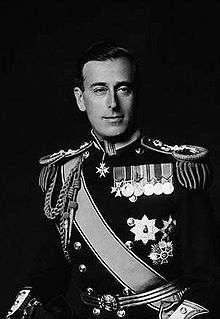 |
Admiral of the Fleet | The Earl Mountbatten of Burma, KG, GCB, GCSI, GCIE, GCVO, DSO | |
13 July 1959 | 6 years, 2 days | 15 July 1965 |
| Field Marshal | Sir Richard Hull, GCB, DSO | |
16 July 1965 [5] | 2 years, 19 days | 4 August 1967 | |
| Marshal of the Royal Air Force | Sir Charles Elworthy, GCB, CBE, DSO, LVO, DFC, AFC[6] | |
4 August 1967 [7] | 3 years, 247 days | 8 April 1971 | |
| Admiral of the Fleet | Sir Peter Hill-Norton, GCB | |
9 April 1971 [8] | 2 years, 195 days | 21 October 1973 | |
| Field Marshal | Sir Michael Carver, GCB, CBE, DSO & Bar, MC | |
21 October 1973 [9] | 3 years, 3 days | 24 October 1976 [10] | |
| Marshal of the Royal Air Force | Sir Andrew Humphrey, GCB, OBE, DFC, AFC | |
24 October 1976 [11] | 92 days | 24 January 1977 | |
| Admiral of the Fleet | Sir Edward Ashmore, GCB, DSC | |
9 February 1977 | 202 days | 30 August 1977 | |
| Marshal of the Royal Air Force | Sir Neil Cameron, GCB, CBE, DSO, DFC[12] | |
31 August 1977 [13] | 2 years, 0 days | 31 August 1979 | |
| Admiral of the Fleet | Sir Terence Lewin, GCB, LVO, DSC | |
1 September 1979 | 3 years, 29 days | 30 September 1982 | |
| Field Marshal | Sir Edwin Bramall, GCB, OBE, MC | |
1 October 1982 [14] | 3 years, 30 days | 31 October 1985 | |
| Admiral of the Fleet | Sir John Fieldhouse, GCB, GBE | |
1 November 1985 | 3 years, 38 days | 9 December 1988 | |
| Marshal of the Royal Air Force | Sir David Craig, GCB, OBE | |
9 December 1988 [15] | 2 years, 113 days | 1 April 1991 | |
| Field Marshal | Sir Richard Vincent, GBE, KCB, DSO | |
2 April 1991 [16] | 1 year, 273 days | 31 December 1992 | |
| Marshal of the Royal Air Force | Sir Peter Harding, GCB | |
31 December 1992 [17] | 1 year, 72 days | 13 March 1994 | |
| Field Marshal | Sir Peter Inge, GCB | |
15 March 1994 [18] | 3 years, 17 days | 1 April 1997 | |
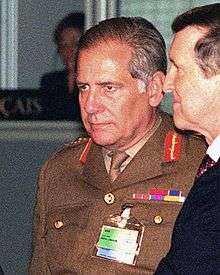 |
General | Sir Charles Guthrie, GCB, LVO, OBE | |
2 April 1997 [19] | 3 years, 319 days | 15 February 2001 |
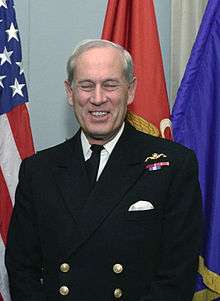 |
Admiral | Sir Michael Boyce, GCB, OBE | |
16 February 2001 [20] | 2 years, 75 days | 2 May 2003 |
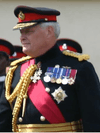 |
General | Sir Michael Walker, GCB, CMG, CBE | |
2 May 2003 [21] | 2 years, 361 days | 28 April 2006 |
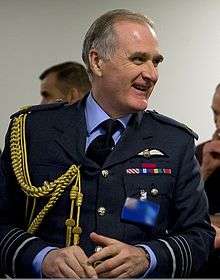 |
Air Chief Marshal | Sir Jock Stirrup, GCB, AFC | |
28 April 2006 [22] | 4 years, 184 days | 29 October 2010 |
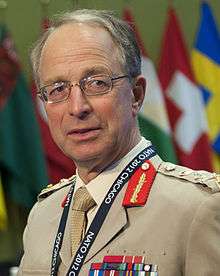 |
General | Sir David Richards, GCB, CBE, DSO | |
29 October 2010 [23][24] | 2 years, 271 days | 18 July 2013 |
 |
General | Sir Nick Houghton, GCB, CBE, ADC | |
18 July 2013 [25] | 3 years, 142 days | 14 July 2016 |
 |
Air Chief Marshal | Sir Stuart Peach, GBE, KCB, ADC, DL | |
14 July 2016 [26] | 146 days | Currently in appointment |
Timeline

Peerage
Customarily, former Chiefs of Defence Staff receive a life peerage on retirement, sitting in the House of Lords as non-political crossbench peers. Their appointment is recommended not via the House of Lords Appointments Commission as is normal procedure, but is instead nominated directly to Her Majesty The Queen by the Prime Minister, who elects to nominate "a limited number of distinguished public servants" on retirement for a peerage. Sir Jock Stirrup was introduced to the House of Lords on 1 February 2010 as Baron Stirrup of Marylebone in the City of Westminster.[23][27][28]
References
- 1 2 Departmental Resource Accounts 2006-7 Ministry of Defence
- ↑ Farmer, Ben (21 January 2016). "Senior RAF officer who commanded Britain's intervention in Libya will be next Chief of the Defence Staff". The Telegraph. Retrieved 21 January 2016.
- ↑ Central Top Level Budget Ministry of Defence
- ↑ Barrass, Malcolm (25 September 2007). "Marshal of the RAF Sir William Dickson". Air of Authority – A History of RAF Organisation. Retrieved 28 April 2009.
- ↑ The London Gazette: (Supplement) no. 43712. p. 6717. 13 July 1965. Retrieved 2010-10-29.
- ↑ Barrass, Malcolm (16 June 2007). "Marshal of the RAF The Lord Elworthy of Timaru". Air of Authority – A History of RAF Organisation. Retrieved 7 March 2010.
- ↑ The London Gazette: (Supplement) no. 44376. p. 8445. 28 July 1967. Retrieved 2010-10-29.
- ↑ The London Gazette: (Supplement) no. 45168. p. 8853. 7 August 1970. Retrieved 2016-06-22.
- ↑ The London Gazette: (Supplement) no. 46109. p. 12551. 23 October 1973. Retrieved 2010-10-29.
- ↑ The London Gazette: (Supplement) no. 47050. p. 14418. 25 October 1976. Retrieved 2016-06-23.
- ↑ The London Gazette: (Supplement) no. 47050. p. 14421. 25 October 1976. Retrieved 2010-10-29.
- ↑ Barrass, Malcolm (16 June 2007). "Marshal of the RAF Lord Cameron of Balhousie". Air of Authority – A History of RAF Organisation. Retrieved 30 May 2010.
- ↑ The London Gazette: (Supplement) no. 47311. p. 11141. 26 August 1977. Retrieved 2010-10-29.
- ↑ The London Gazette: (Supplement) no. 49142. p. 13571. 18 October 1982. Retrieved 2010-10-29.
- ↑ The London Gazette: (Supplement) no. 51550. p. 13684. 5 December 1988. Retrieved 2010-10-29.
- ↑ The London Gazette: (Supplement) no. 52489. p. 5083. 28 March 1991. Retrieved 2010-10-29.
- ↑ The London Gazette: (Supplement) no. 53184. p. 1376. 25 January 1993. Retrieved 2010-10-29.
- ↑ The London Gazette: (Supplement) no. 53645. p. 5799. 18 April 1994. Retrieved 2010-10-29.
- ↑ The London Gazette: (Supplement) no. 54726. p. 4170. 7 April 1997. Retrieved 2010-10-29.
- ↑ MoD announces new Chief of Defence Staff
- ↑ The London Gazette: (Supplement) no. 56992. p. 8463. 8 July 2003. Retrieved 2010-10-29.
- ↑ SBAC RAF Chief becomes the new Chief of Defence Staff
- 1 2 "Outgoing CDS to receive peerage". Downing Street. 27 October 2010.
- ↑ The London Gazette: (Supplement) no. 59593. p. 21039. 2 November 2010. Retrieved 2016-06-23.
- ↑ "Sir David Richards to become a lord – after overseeing the sacking of 20,000 troops". 13 July 2013. Retrieved 14 July 2013.
- ↑ "Chief of the Defence Staff Sir Stuart Peach GBE KCB ADC DL". 14 July 2016. Retrieved 14 July 2016.
- ↑ House of Lords Business, February 1, 2011
- ↑ "Gen Sir David Richards new head of British armed forces". BBC News. 14 July 2010.

